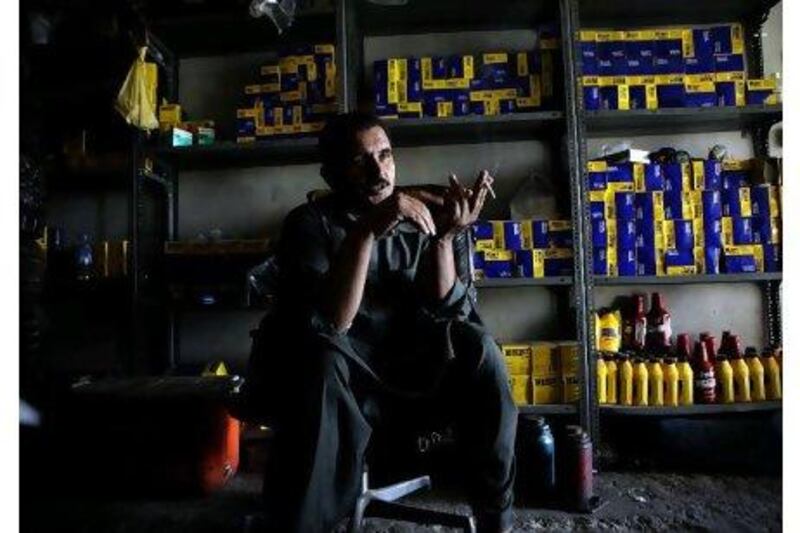MIRFA // The hundreds of men who work in the shops alongside the Ghweifat motorway are uncertain what the future will hold once the new road opens.
"Here business is secure. If they make a road to the other side, all the shops will close," said Mohammed Ramzan, a white-bearded father of five from Pakistan. "This is too much problem for this business."
Mr Ramzan is one of 100 or so men who works at a collection of shops on a sabkha (salt flat) that borders one of Earth's most inhospitable landscapes.
The shops bear evocative names: Al Gazelle Valley Restaurant, Piercing Star Spare Parts, Flower of Tarif Auto Parts.
Here, drivers can stock up on vegetables, toothpaste and glow-in-the-dark prayer beads or get their hair cut at the Jabal Al Noor Saloon, a barber shop with posters of waterfalls, Mecca and Sheikh Khalifa, covered with strings of small plastic roses.
Even as traffic has increased and benefited their business - 30 per cent in the last five years according to some - it could also prove to be their undoing.
"What can I do?" said Mr Ramzan, who manages a mechanics' shop and has worked here for 20 years. "I will move back to Pakistan."
His "whole village" works on the motorway: he has an uncle in Sila, a brother in Tarif and a cousin here, in addition to many friends along the route.
Mr Ramzan would rather close his shops than resettle and will work in the family business, farming wheat and sugarcane, in Pakistan.
"If I do not have a relationship with my neighbour, what am I doing here?"
But, he adds: "If this is a government idea, it must be a good idea."
Farman Allah, 56, a lorry driver from Pakistan, is less concerned about amenities and more concerned about policing.
In a small cabinet under the cargo space of his lorry, he has a collection of prayer mats, pots, pans and spices, a freezer and a gas cooker on which he boils eggs at pit stops from Dubai to Jeddah.
"It's my restaurant," he says, spicing the eggs he is cooking.
The Pakistani has been on these roads for 15 years and see no problem with the current motorway, even as traffic has increased.
His one complaint: "Too many police."
"It's a problem because you can't overtake," he said.
His second concern is tyre punctures -but only because he is worried about fines, not safety.
Mrs Mohammed Hassan, a Mirfa resident who gave only her husband's name, is dismissive of the danger.
The few residential towns that line the motorway are in pristine condition. The biggest danger is on the road networks that lie outside the capital.
"The road we have now is good, it's no problem," she said. "Well, yesterday there were accidents. There are lots of accidents, we need lights. But that's normal."






